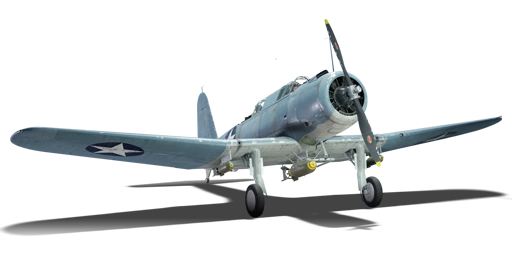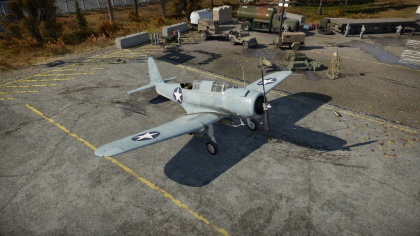Difference between revisions of "SB2U-2"
(Added basic information and tables.) |
m (Minor edit.) |
||
| Line 6: | Line 6: | ||
[[File:GarageImage_{{PAGENAME}}.jpg|420px|thumb|left]] | [[File:GarageImage_{{PAGENAME}}.jpg|420px|thumb|left]] | ||
{{break}} | {{break}} | ||
| − | The '''{{Specs|name}}''' is a Rank {{Specs|rank}} American bomber {{ | + | The '''{{Specs|name}}''' is a Rank {{Specs|rank}} American bomber {{Battle-rating|1}}. It was introduced in [[Update 1.75 "La Résistance"]]. |
The SBU2 was developed in the early 1930s and although considered obsolete at the outbreak of World War II, it still remained in service through the Battle of Midway, however in 1943 it was withdrawn into training units and replaced by more advanced aircraft. This aircraft featured a constant-speed propeller which was intended to be utilized as a dive brake while performing dive bombing attack maneuvers. There were three hard points for bombs to be attached, one 250 lb bomb under each wing and a single 500 or 1,000 lb bomb mounted onto a pylon under the fuselage. The larger bomb was also attached to what was called a “trapeze”, a device which would when the bomb was released, swing the bomb clear of the propeller arc. | The SBU2 was developed in the early 1930s and although considered obsolete at the outbreak of World War II, it still remained in service through the Battle of Midway, however in 1943 it was withdrawn into training units and replaced by more advanced aircraft. This aircraft featured a constant-speed propeller which was intended to be utilized as a dive brake while performing dive bombing attack maneuvers. There were three hard points for bombs to be attached, one 250 lb bomb under each wing and a single 500 or 1,000 lb bomb mounted onto a pylon under the fuselage. The larger bomb was also attached to what was called a “trapeze”, a device which would when the bomb was released, swing the bomb clear of the propeller arc. | ||
Revision as of 11:30, 6 December 2018
Contents
| This page is about the aircraft SB2U-2. For other uses, see SB2U (Disambiguation) |
Description
The SB2U-2 is a Rank I American bomber
with a battle rating of 1.0 (AB/RB) and 1.3 (SB). It was introduced in Update 1.75 "La Résistance".
The SBU2 was developed in the early 1930s and although considered obsolete at the outbreak of World War II, it still remained in service through the Battle of Midway, however in 1943 it was withdrawn into training units and replaced by more advanced aircraft. This aircraft featured a constant-speed propeller which was intended to be utilized as a dive brake while performing dive bombing attack maneuvers. There were three hard points for bombs to be attached, one 250 lb bomb under each wing and a single 500 or 1,000 lb bomb mounted onto a pylon under the fuselage. The larger bomb was also attached to what was called a “trapeze”, a device which would when the bomb was released, swing the bomb clear of the propeller arc.
The SBU2-2 is a carrier based dive bomber. This aircraft is a fairly slow aircraft, but sturdy. Built as a dive-bomber, it excels at diving down above a target to release its bombs. The SBU2 is one of the only early aircraft in War Thunder which features dive flaps (h) to aid in retarding the build up of speed during a dive, helping prevent ripping off of wings in RB and SB. Wing mounted machine guns allow for this aircraft to strafe softer ground or water targets while waiting for bombs to reload (AB). Rear facing dorsal gunner helps to ward off enemy attackers, however it is not a game changer for this aircraft.
General info
Flight Performance
| Characteristics | |||||||
|---|---|---|---|---|---|---|---|
| Stock | |||||||
| Max Speed (km/h at 4,084 m) |
Max altitude (meters) |
Turn time (seconds) |
Rate of climb (meters/second) |
Take-off run (meters) | |||
| AB | RB | AB | RB | AB | RB | ||
| 338 | 329 | 6,800 | 23.6 | 24.5 | 3.7 | 4.5 | 300 |
| Upgraded | |||||||
| Max Speed (km/h at 4,084 m) |
Max altitude (meters) | Turn time (seconds) | Rate of climb (meters/second) |
Take-off run (meters) | |||
| AB | RB | AB | RB | AB | RB | ||
| 383 | 360 | 6,800 | 20.4 | 22.0 | 9.7 | 6.2 | 300 |
Details
| Features | ||||
|---|---|---|---|---|
| Combat flap | Take-off flap | Landing flap | Air brakes | Arrestor gear |
| X | X | ✓ | ✓ | ✓ |
| Limits | ||||
|---|---|---|---|---|
| Wing-break speed (km/h) |
Gear limit (km/h) |
Combat flap (km/h) |
Max Static G | |
| + | - | |||
| ??? | ??? | ??? | ~?? | ~? |
| Optimal velocities | |||
|---|---|---|---|
| Ailerons (km/h) |
Rudder (km/h) |
Elevators (km/h) |
Radiator (km/h) |
| < ??? | < ??? | < ??? | > ??? |
| Compressor (RB/SB) | ||
|---|---|---|
| Setting 1 | ||
| Optimal altitude | 100% Engine power | WEP Engine power |
| ?,??? m | ??? hp | ?,??? hp |
Survivability and armour
- 3 mm Steel boxes behind the gunner.
- No armour glazing
- Critical components located at front of aircraft (fuel, pilot, engine, controls)
- More fuel tanks located in wings near fuselage
Armaments
Offensive armament
The SB2U-2 is armed with:
- 2 x 7.62 mm Browning machine guns, wing-mounted (1,000 rpg = 2,000 total)
Suspended armament
Main article: Bombs
The SB2U-2 can be outfitted with the following ordinance:
- 1 x 500 lb AN-M64A1 bomb + 2 x 100 lb AN-M30A1 bombs (700 lb total)
- 1 x 500 lb AN-M64A1 bomb + 2 x 250 lb AN-M57 bombs (1,000 lb total)
- 1 x 1,000 lb AN-M65A1 bomb (1,000 lb total)
Defensive armament
The SB2U-2 is defended by:
- 1 x 7.62 mm Browning machine gun, rear turret (600 rpg)
Usage in the battles
The SBU2 is a slow aircraft which leads it to having two options, first is to hug the terrain. While flying to your target of choice (AAA sites, AA Vehicles or bases), fly along the terrain, utilize what hills and valleys there are to fly through. Time on target may be limited before the enemy gets there so line up your bombing run and drop bombs. This aircraft can maneuver fairly well, utilizing elevator and rudder controls, you can quickly flip this aircraft around and return to ground attacking targets you just flew over.
The second option will be to gain altitude. Going too high will render your bombs ineffective. The idea here is to gain several thousand feet, fly towards your target of choice and then dive on it. During your dive, your aircraft will build up speed, to prevent too much speed build up and control stiffening, reduce your throttle and engage dive brakes (h). This will allow you a controlled descent and the ability to line up your target easier, the unfortunate down side is that now you are slowly moving in a straight line, easy target for enemy fighters. Once you swoop on your target and release your bombs, engage full throttle and retract dive brakes.
While this aircraft is slow, it can be utilized to attack fighters if in a pinch. The maneuverability of this aircraft along with its slow speed can aid in forcing an attacking enemy to overshoot or underestimate the capabilities of this aircraft.
The rear-facing dorsal gunner does not deter much, don’t rely on him to clear your tail of trailing aircraft. Enemy fighters will assume this aircraft to be an easy target due to its size and slow speed.
The SBU2 is a slow aircraft, however it is maneuverable. Due to the large surface area of the wings and rudder, it can make quick reversals through wing-overs causing faster fighters to overshoot. The rear-gunner does not pack much of a punch, however coming at this aircraft from the underside will avoid any offensive/defensive weapons allowing for time to line up a shot. Aim for critical areas of the aircraft (engine, pilot, fuel…) as the body of the aircraft can soak up a good amount of damage.
Manual Engine Control
| MEC elements | ||||||
|---|---|---|---|---|---|---|
| Mixer | Pitch | Radiator | Supercharger | Turbocharger | ||
| Oil | Water | Type | ||||
| Controllable | Not controllable | Not controllable | Not controllable | Separate | Not ontrollable | Not controllable |
Modules
| Tier | Flight performance | Survivability | Weaponry | ||
|---|---|---|---|---|---|
| I | Fuselage Repair | Radiator | Offensive 7 mm | FSBC mk.5 | |
| II | Compressor | Airframe | New 7 mm MGs | ||
| III | Wings Repair | Engine | Turret 7 mm | FLBC mk.1 | |
| IV | Engine Injection | Cover | New 7 mm MGs (turret) | ||
Pros and cons
Pros:
- Maneuverable
- Dual role dive bomber/attacker
- Good diver
Cons:
- Large target
- Slow speed
- Weak defensive weapons
- Small payload
History
Describe the history of the creation and combat usage of the aircraft in more detail than in the introduction. If the historical reference turns out to be too big, take it to a separate article, taking a link to an article about the vehicle and adding a block "/ historical reference" (example: https://wiki.warthunder.com/Name-vehicles/historical reference) and add a link to it here using the main template. Be sure to include links to sources at the end of the article.
Media
An excellent addition to the article will be video guides, as well as screenshots from the game and photos.
Read also
Links to the articles on the War Thunder Wiki that you think will be useful for the reader, for example,
- reference to the series of the aircraft;
- links to approximate analogues of other nations and research trees.
Sources
Paste links to sources and external resources, such as:
- topic on the official game forum;
- page on aircraft encyclopedia;
- other literature.
| USA bombers | |
|---|---|
| Dive | SB2U-2 · SB2U-3 · SBD-3 · SB2C-1C · SB2C-4 |
| Torpedo | TBD-1 · PBY-5 Catalina · PBY-5A Catalina · TBF-1C · BTD-1 |
| Medium | B-10B · B-18A · B-34 · PV-2D · B-25J-1 · B-25J-20 · A-26C-45 · A-26C-45DT · B-26B |
| Heavy | B-17E · B-17E/L · B-17G-60-VE · PB4Y-2 · B-24D-25-CO · B-29A-BN |
| Hydroplanes | OS2U-1 · OS2U-3 · PBM-1 "Mariner" · PBM-3 "Mariner" · PBM-5A "Mariner" |





